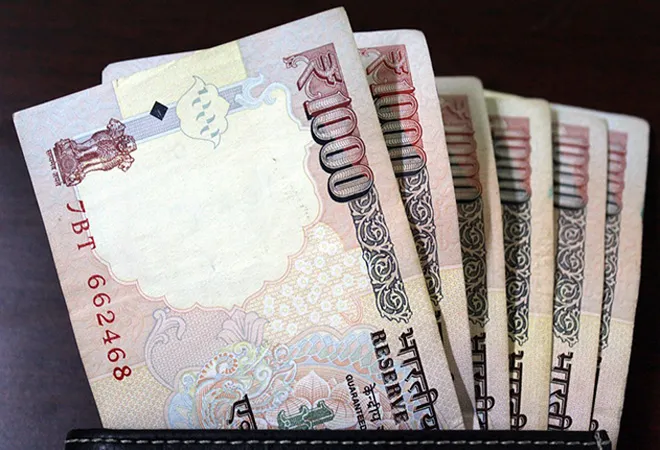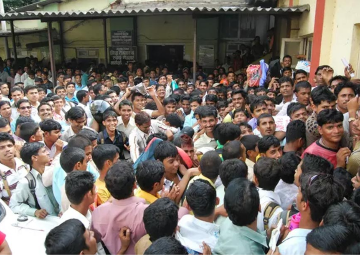Two months into Narendra Modi's demonetisation, the opposition looks like it is still flailing for a response - at least in the short term. Speaking at the giant rally in Lucknow that revitalised his party's campaign, the Prime Minister wasn't shy about repeating the virtues of note-bandi, as he saw them: it was, he said a transfer from the corrupt rich to the virtuous poor. This has been the narrative since early on, but it's one that Modi has doubled down in recent weeks - both at this rally and during his speech on December 31. The PM is too smart a political operator to not have figured out what messaging is working.
Which is why the opposition is flailing. It's worried it's missed the bus. Demonetisation - the way it was conceived, which carried within it massive flaws that emerged in its implementation - was bound to create chaos and hardship for minimal benefits. A policy with those characteristics should have been possible for Modi's competitors to create a swell of opposition against. Amplifying and linking up those murmurs of dissent in such a way that they become a credible counter to the "At Least Modi Did Something" narrative should have been their first impetus. And some tried - Mamata Banerjee, for example. But too many parties worried that coming out against the note ban would sound like they themselves were corrupt. Arvind Kejriwal, for example, went silent shortly after the announcement because he couldn't figure a way out of the rhetorical trap Modi baited for him: "If you're against this, you're for black money, and thus you're corrupt."
Read | < style="color: #960f0f">In a suprise move, Modi Govt demonitises high denomination notes
An effective opposition - even if its leaders felt they didn't have the credibility - would at least have found other voices to take the fight to the government. The way the BJP hid behind Anna Hazare in UPA-II is a good example. The Congress used to be good at using such proxies - perhaps it still is, in certain circumstances and certain states, if Hardik Patel is any indication. But at the national level, it's failed even to find that sort of "apolitical" figurehead for an anti note-bandi movement.
Are things turning, finally? Nobody can accuse Sharad Yadav and Nitish Kumar, the two stalwarts of the Janata Dal (United), of seeing eye-to-eye too often. But still, Yadav's recent Twitter outburst - in which he argued the rich have escaped note-bandi harshness, all the money will "come back" to the Reserve Bank of India, and implied thus that it was an anti-poor measure - is indicative. Nitish Kumar was firm in his support; Yadav has come out against it. The narrative of "the rich are escaping" should have been the drum beaten from Day One; it has the not inconsiderable benefit, after all, of being true. The Opposition may finally be uniting around that narrative - but perhaps a bit late, at least for UP and the other states going to polls shortly.
Read | < style="color: #960f0f">Who will trust the RBI or government now?
True, the opposition has not been completely useless. At least the parliamentary parties are doing their job, trying to hold the executive to account - at least through those parts of Parliament that work. The Indian Express reported some time ago said that Manmohan Singh has suggested a focus on what the RBI decided about demonetisation and when it decided that. And now, reports have emerged that the parliamentary committee that has summoned Urjit Patel at the end of this month will ask a few hard questions along those lines. On one level this makes sense - it forced the government to either cede credit for demonetisation or accept that it has steamrolled the RBI.
Of course, you could argue that no voters in rural UP care if the government has undermined the RBI's independence. But it's not as esoteric as all that, either. The RBI regulates the banks, and banks are a big part of people's lives now. If the evolving narrative is "Modi's idea is good, the banks, etc are implementing it badly", then pointing out that the people who run the banks are answering directly to the top of the government is a worthwhile endeavour.
Read | < style="color: #960f0f">Modi’s speech was an admission of defeat
But the Opposition's larger failure to counter the government's narrative is more than a political story - it's an abdication of responsibility. Demonetisation is one of the most drastic economic measures that this country has seen, and Modi's framing of the narrative has meant it's been largely insulated from political criticism.
Even if it were the greatest idea since sliced bread, that would have been a bad thing. Given that it is instead poorly-thought-through, the lack of accountability born of a confused opposition is particularly pernicious. The PM, already a brilliant salesman, will be convinced now that he can sell anything. The impact of this on future decision-making is ominous. For everyone's sake, the opposition better get its act together on note-bandi - and soon.
This commentary was published in NDTV.com
The views expressed above belong to the author(s). ORF research and analyses now available on Telegram! Click here to access our curated content — blogs, longforms and interviews.




 PREV
PREV


